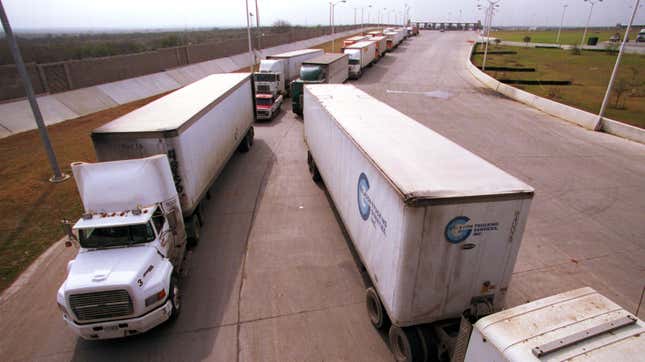
Car sales have certainly fallen off a cliff amid the coronavirus pandemic, but trailer sales are even worse, in an abyss so deep that you only need three digits to count how many were sold in April.
That number would be 300, according to Commercial Carrier Journal, which is a 98 percent year-over-year drop, the lowest level ever recorded. Trailer orders have averaged 13,500 per month for the preceding 12 months. Per the Journal:
[Don Ake, FTR vice president of commercial vehicles] said buying activity appears to be on hold until fleets can see a clear path forward, but he expects larger fleets will resume replacing old trailers “as soon as they see the economic restrictions lifted and freight growing again.”
The dry van segment was hit particularly hard last month and refrigerated van orders suffered some as well. Vocational orders remained tepid after falling significantly in March, FTR noted. Some specialty segments are holding up better under the stress.
“The key element to the trailer market recovery is for fleet confidence to improve. Carriers saw freight softening at the beginning of the year and then it cratered due to the recession caused by COVID-19,” Ake said.
There is a similar dynamic in car rental companies, which are rushing to not buy new cars and, in the case of Hertz, are in more dire straits. And while some truckers are still on the road, the industry as a whole has been hit as hard as everyone else, as shipments dry up and the economy remains closed in a lot of places, wiping out the need for freight shipping.
From Reuters:
According to the International Road Transport Union (IRU) in Geneva, which represents operators in 80 countries, new freight contracts have declined by 60% to 90% since COVID-19 struck while empty runs have climbed by up to 40%.
For truckers shipping products such as car parts, clothes, flowers and construction materials, operations have ground to an almost complete halt, the IRU said.
The routes that are left also aren’t paying as much, while the industry is more decentralized than others, with smaller players left to fight for scraps, as Reuters reports:
If the pain is prolonged, smaller U.S. carriers which cannot spread their costs across a large fleet could shut their doors, pushing skilled drivers out of the business and accelerating a longer-term shortage of truckers, industry groups say.
Some 97% of trucking companies in the United States operate fewer than 20 trucks, and 91% have six or fewer, according to the American Trucking Associations. Those workers rely more often on one-off jobs than long-term contracts.
Some routes are paying just 75 cents to 80 cents a mile, less than half of what’s needed to pay for fuel, insurance and other operating costs, according to five truckers. Pay is mostly determined by distances driven and they have also dropped.
Given this context, it’s almost surprising that 300 trailers sold at all, if everyone’s just trying to hang on. It feels like for most people that’s the only option currently: just hanging on.